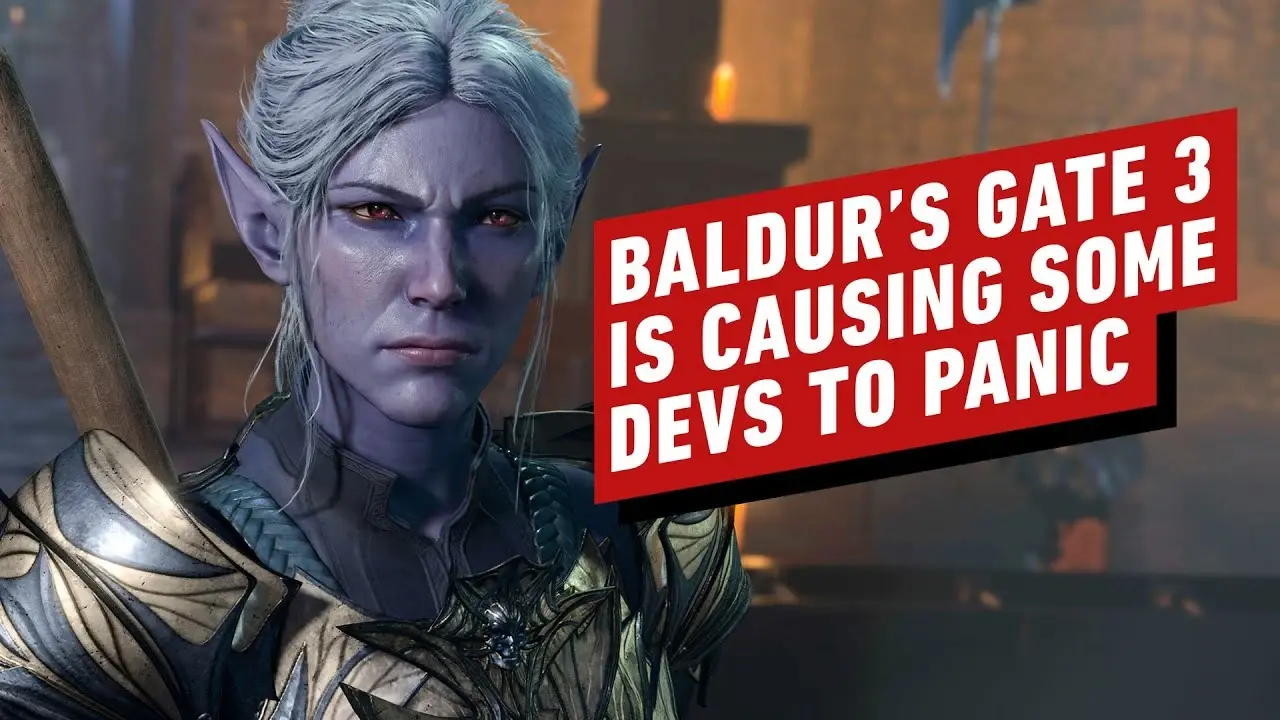- cross-posted to:
- gaming@kbin.social
While Baldur’s Gate 3 is being widely celebrated by fans and developers alike, some are panicking that this could set new expectations from fans. Good.

Click baiting video. Other devs don’t care. As long as they can make money pumping out mediocre games then they will continue to do so. Acting like this is the first good game to come out in a decade or something.

DEVs do care. As a developer working on something you want to be proud of it. Publishers do not care.

The individuals working on the game might care.
The managers who make the decisions don’t. Doesn’t matter if they are a publisher or the development company itself. It’s a bit blurry these days anyway, what with how easy it is to self publish and how many publishers have their own internal development studios.

The managers who make the decisions is also unclear as power differs on the company. They could care all the way up to the CEO but if the CEO puts an unrealistic deadline, the game has an unrealistic deadline

Looking at how many games have stood in Dragon Age: Origins’ shadow over the past decade, I get the sense that lots of studios wanted to create the true spiritual successor but couldn’t come up with the resources to do so.

Or if not lacking resources, definitely lacking the creative freedom.
- shiveyarbles ( @shiveyarbles@beehaw.org ) 107•11 months ago
BG 3 is so stupid, it’s not even optimizing micro transactions for maximum profits

How am I supposed to feel a sense of pride and accomplishment without paying for my dice rolls?

Wonder what a divine crit roll would cost, $5 in combat $3 outside? Heck that’s too complicated $10 for all, $7 for season pass holders.
For those wondering there is no season pass.

They would have to also start charging to save scum. Why would I pay $5 for a crit when I can just reload my save and try until I get one? Every new save is $0.50 and every reload is also $0.50.

Fuck it, exiting the game now costs $2. We need to recoup the opportunity cost of you not being somewhere you can be directly marketed to.

How can I save time and pay to skip playing the game?

Unity CEO has entered the chat

“Leaving money on the table” must be the exec’s perspective.

“Oh no fans might demand good games at release! The horror!”

Won’t anybody think of the stockholders‽

Oh no, if people remember that games are supposed to be good, no one will buy our lootbox-infested crap anymore.
Good.

Loot boxes are so 2017. It’s all about battle passes, engagement, and player retention now.

You know what creates engagement and retains players?
Making a good game that’s actually fun to play instead of focusing on how you’re gonna sell me hats and paint jobs and weaponizing FOMO.

But however will the poor shareholders get their value this quarter?
Someone think of the shareholders!
- eskimofry ( @eskimofry@lemmy.ml ) 2•11 months ago
Oh I am thinking of them… how to murder shareholders in various unique ways… could be neat game idea too!

As much as I prefer this model that actually isn’t what creates engagement and retains players over several games and years. They don’t do it because it’s fun to make predatory things. They do it because it makes them heaps of money. If it didn’t work, they wouldn’t do it. That’s the sad truth here.
Re: hats and paint jobs…hats dominated TF2 for how long? There was a black market and widespread scamming for cosmetics, that’s how nuts it got.

I wonder if the TF2 “buds” item is still used as a game-trading currency.

Sorry, but the other methods are demonstrably better at it. We didn’t arrive at them by accident. There are outliers like Civilization keeping people hooked for years; the people still playing Skullgirls all these years later sure aren’t doing it for any type of reward system. But the fast track to keeping people playing your game is to use all the scummy bullshit.

I wonder why they haven’t tried the model airport books and comics use, though. We could do it with games at this point. Like, make a series of games that are low budget, relatively short, and easy to pump out very quickly, but with a distinct series identity and maybe a consistent writer/artist across games. Then make a lot of them and get people hooked on the series instead of on 1 mega game.
Even just text adventure style games, wireframe arcade style games, bullethells, shooters like Vampire Survivor & etc, visual novels, syuff like Undertale, whatever? I think it’s clear that a low budget or small team doesn’t equate to unpopularity these days, if the game is made with care and attention to detail.
We do have series now but they’re high budget and long and kind of also trying to be the 1 mega game at the same time.
There’s also a lot of options for reaching new/underserved audience. Like. Make a high quality horse game for once, please? And profit off a bazillion horse girls who’ve been waiting for just that for decades.
Or make games for other countries that don’t have a big video games market yet, maybe. Like sell a console real cheap, at a loss, and then sell games in an area where there’s less competition? Maybe.

a series of games that are low budget, relatively short, and easy to pump out very quickly, but with a distinct series identity and maybe a consistent writer/artist across games
Telltale has entered (and exited) the chat.

I wonder why they haven’t tried the model airport books and comics use, though. We could do it with games at this point. Like, make a series of games that are low budget, relatively short, and easy to pump out very quickly, but with a distinct series identity and maybe a consistent writer/artist across games. Then make a lot of them and get people hooked on the series instead of on 1 mega game.
I think that’s exactly what Fortnite and Destiny 2 do, even though I object to the way they do it for so many reasons.

Like, make a series of games that are low budget, relatively short, and easy to pump out very quickly, but with a distinct series identity and maybe a consistent writer/artist across games. Then make a lot of them and get people hooked on the series instead of on 1 mega game.
Urban Games currently does this with Transport Fever. They flat out said while hyping the release of Transport Fever 2 (which was their third transport tycoon style game) that their goal as a development studio is to make the best transportation tycoon game they can. So they intend to continuously iterate.
N3V Games, who developes the Trainz simulator game was literally formed to buy up the property and talent from its original developer Auran and continue the franchise
There’s a third example I was going to give but got distracted while writing this comment and forgot

One example might be Fnaf (before security breach or help wanted), since they are relatively simple, short games made by one guy, not on high budget. Most of them launched like 3-6 months after each other, keeping up interest in the series.
Something big aaa games also miss is the creativity, since a cool gimick can be implemented as a main mechanic in a 1-2 hour game, since it doesnt over stay its welcome.
So yeah, most games are getting too long for their own good (like ubi sandbox games), not to mention the ‘games as a service’ games.

people remember that games are supposed to be good
I’ve played a lot of great games in the past few years 🤷♂️

If you have to panic because a competitor makes a good game maybe you should reconsider why you’re a game developer in the first place. If it’s not to make the best games you can make, you shouldn’t be a game developer. I’m guessing the developers panicking aren’t the ones who pour their heart and soul into every game they make.

Maybe release 1 good game every year or two instead of 10 mediocre games a year to make as much cash as possible.
I don’t have a convenient way to play this game at the moment, but I’ll pick it up as soon as I get a steam deck.

Sir, allow me to introduce you to capitalism

Yeah! This is why I’m mostly play retro games before the j turner was introduced to consoles.

The ultimate enshittification speedrun

The companies we’re all complaining about stopped making 10 games per year a long time ago.

I largely agree, but there is one thing to consider: the amount of money and time they were given for this game is incredibly unusual. Three years of early access is also very unusual for AAA-level games, that’s mostly relegated to over ambitious indies with inflated budgets. It’s also rare to see that kind of budget with so much autonomy and trust.
We need to remember that some developers simply do not have the same resources and time as others. BG3 has set a whole new bar and matching that with the current industry will be difficult. Who we really need to put pressure on is publishers who are rushing them to market and damning the consequences. They are by and large responsible for this mess and they control the vast majority of the money flowing into games.
My counter to that is the last 2.5 BioWare games - I say 2.5 because Dreadwolf has been in development for ten years total now and still isn’t out. Andromeda was in development for 5 years. Anthem had money galore thrown at it until it came out. Too many devs, not just BioWare, are wasting years of development time because they haven’t got a clue what they can feasibly make then rush to get things out the door.
Instead of making excuses for why gave dev is the way it is now - a way that isn’t working - maybe look at what Larian did right and ask why more studios aren’t doing that. Early Access is normal used by indies with overinflated budgets? Well, why aren’t larger studios taking advantage of it or using systems like it?
The new normal for a have to be developed is turning into 5+ years, and there’s no excuse for the hot messes that have been coming out lately.

I’d like to ask…why are publishers even required anymore? Games don’t need physical releases anymore. You don’t need a publisher to host a zip file on a web server. Storefronts let indie developers self-publish so why do the big names still fall for the publishers who exist only to enshittify gaming anymore? They bring negative value to the industry.

They bring funding when you have none. Also marketing. How likely are we to have heard of The Plucky Squire without it being featured alongside several other Devolver games?

Because all those things make it possible to release independently, it’s still not easy. Marketing and getting exposure is hard, it’s a totally different skill. With a publisher, you don’t have to worry about any of that - you might even get funding up front.
Personally, I still think it’s worth doing - I’m in that position, and although I’m having a lot of trouble getting off the ground, at least I’m free to follow my visions
But I get why people would do it. A slice of a big pie is worth more than all of a tiny one.
It’s also stressful if it’s not in your skillset - I’ve started using chat gpt to rewrite my announcements and such. Before I’d stress trying to put them together and focused on being clear and honest, but no one was reading them. I find it worse than public speaking, at least when I get on stage I’m too busy to feel self conscious.
The stuff I come up with using chat-gpt is a bit cringe, but at least people read them - sadly corpo speak draws people in

The only thing I can think of is branching dialogs in RPGs. J. Sawyer said that better than I can: https://youtu.be/eeUwPLxsp7Y

Developers? Panicking? Developers will rejoice that they don’t have to build these garbage mechanics. Publishers and game studio execs? Yeah they’ll panic

Honestly I hope this does indeed set a new gold standard. Probably not with the whole early access thing, though. It’s a thing that needs to go away.

EA is an immensely useful tool for game devs, the issue is EA as an excuse to ship unpolished games or to leave games unfinished forever. Neither of which are problems intrinsic to early access, they’re just bad business practice that should be shunned like any other

As a gamedev: Early Access was useful for devs, back when it was real Early Access. Think: Kerbal Space Program (the first, not the second).
Nowadays it’s mostly a marketing tool, that allows to generate the hype for launch twice… Publishers and players expect “Early Access” games to be feature complete and polished before the “Early Access” launch…

And again, Larian Studios used EA as intended, which allowed them to publish a good, polished game.
As did Supergiant, with Hades. When Early Access is used properly, it can help make a great game.

I liked what Daemon X Machina did, where they released a demo, sent out questionnaires to everyone who downloaded it, published a video about the results save how they were planning to act on it, and a few months later released a new demo with a new questionnaire.

Yep, that’s probably the most helpful thing for devs. This sadly often conflicts with publishers’ announcement schedules. There are, however, companies that do NDA-protected play-tests, where you get the same kind of information, without publicly announcing the game.

Ubisoft did (does?) it to a degree with their Rainbow 6 TTS (beta) servers to test the sandbox and did so for a few technical alpha/beta releases acting as selected pewviews to see how the game is received and where bugs are.

Early access worked well for them, part of the start of the game was able to be play tested, the community got to give feedback, and they actually listened, its how it should be done

Yeah but not how the remaining whole industry treats it.
I saw literally no outcry regarding BG3 and early game bugs. Comparing it to CP2077 it was a stellar release in terms of PR.
CP2077 didn’t have early access tho? How is this an argument against early access

I don’t think Early Access should go away as it’s not inherently bad in and of itself.
What’s bad about it is when it’s used to sell a totally unfinished piece of shit that stays an unfinished piece of shit indefinitely.

Making bad developers panic maybe?
I can’t imagine something like this makes the Redfall devs feel good about themselves.
Actually Redfall likely doesn’t make the Redfall devs feel good about themselves.

Wasn’t the whole thing with Redfall that it was Bethesda mismanagement? I’m not going to put that on the Redfall team. Does make me completely disinterested in buying any Bethesda games that aren’t mainline TES though.

Looks like it went way deeper than that…
https://www.escapistmagazine.com/redfall-development-lost-70-percent-staff-arkane-austin-prey/

That’s just part of the mismanagement.
What worries me is that one of the leakers who was leaking shit about Redfall prior to release who was 100% correct about everything, also said he saw Starfield and it was in worse shape than Redfall was. It’s obviously coming out later, but not that much later.

Starfield is a Bethesda game proper and it’s wise to have appropriate expectations. :)
I forget, on launch wasn’t Fallout COMPLETELY broken for Nvidia cards? Or was it AMD? I can’t remember, it was one or the other…

While true, the state of Redfall was far worse than the expectation for a mainline Bethesda RPG (comparatively), even as bad as they have been in the past. So saying Starfield was in worse shape still has some hefty weight to it, if the leak is true. It will have at least had more time in the oven for things to be fixed up a bit more in line with normal expectations. And that’s my hope.
Plus, Microsoft needs a win, especially after Redfall. They need this one to be hit outside the park.
That’s upsetting. I was never going to play Starfield, but I want games coming out to be good. We don’t need another dumpster fire like the CP2077 launch was.

Such a shame, I was immensely sold on the initial trailer. I did not even end up playing it

For what it’s worth, I thought it’d be horrible from the reviews and ended up trying it anyway, and I actually really enjoyed it. shrug Rather feels like I played a different game than everyone else.
I’m sure it’s partly the difference between starting with rock bottom expectations vs starting with Prey/Dishonored expectations, but I think even without that I’d like it.
Also, it has no micro transactions! Zero. Not even for cosmetics - those are just unlockables. Credit where credit is due.
Anyway if you liked the look of the trailer and you have gamepass, it’s worth at least trying, imo.

BG3 is what games used to be and what they should have been like. It bring me back to my KotOR1/2, and Witcher 1 days. It’s great.

How does it cost millions of dollars to make a current AAA game, and they’re rarely worth it?
If you have 5,000 people on your payroll for a game what the hell are they doing? Every game should be fantastic.
I love indie and AA games. Smaller teams. More focus. More fun. Usually more quality content.

It’s an issue of time and scalability. Going from 100 employees to 200 employees wont make the game in half the time. And corporate accounting would rather have 2 mediocre games per year than 1 extremely good game every 2 years, even if it sold 4 times as well since revenue is analyzed within fiscal years and financing isn’t free. Capitalism sucks.

Capitalism sucks.
All the greatest games ever made were created in capitalistic economies so i cannot see how that is a determining factor. I don’t know what games your thinking of. Tetris?

I think you’re missing the point. They’re just saying the incentive structure of capitalism doesn’t necessarily encourage the best types of games. We see this with borked EA launches, predatory MTX, loot boxes, battle passes, etc

I think there is a difference between “capitalism” and “capitalism”.
I think a more nuanced argument is that better games come from companies that are not primarily driven by the quarterly revenue cycle of Wall Street, that is defined as “capitalism”.
I think it’s more of a hit-and-miss, and good corporate leadership is the kind that people forget it’s there when good games come out. I mean CDPR had a CEO both when Witcher 3 was the thing, and also when Cyberpunk 2077 was the thing that flopped. Obviously, people were more interested in the beancounters’ influence in the latter case.

We don’t exactly have many non-capitalistic economies.
But we have games that people made outside of the incentives of capitalism. i.e., because they wanted to make the game they wanted to make. This is what has created the absolute best games in existence. Not the incentive of money.
Was terraria made for the purposes of money? Was outer wilds? No. They were passion projects. Of course they had to earn money, because you need to earn money to survive, but that wasn’t their primary goals. Contrary to games such as call of duty or whatever. Which are just incredibly bland in comparison.
I mean see how much microtransactions, loot boxes, etc. Is ruining the atmosphere of games and exploiting the hell out of people and kids. Don’t tell me devs are putting that in because that is what their dream game would contain. No, they put it in purely because of capitalistic incentives. Would you argue that that is good?

Making a good product is an incentive of capitalism too. Microtransactions, battle passes, loot boxes, and other “live service” trappings dilute once-good products because people are often too attached to brands. As people tire of bad products, good ones can come along and thrive, which is what Battlebit appears to be doing for Battlefield fans, what Baldur’s Gate 3 appears to be doing for RPGs, and what Elden Ring and the last two Zelda games are doing for open world games; what Cities: Skylines did for SimCity fans and maybe what Life By You could do for Sims fans. There’s money to be made for making a good version of something that the reigning champs screwed up, abandoned, couldn’t think of, or didn’t bother to bring to market; that’s capitalism.

Do you think those games wouldn’t have been made without capitalism?
All of those examples are driven by people wanting to make a good game because that is their passion.
If they were given infinite resources to make a game, and would gain nothing else beyond just a decent standard of living or whatever, do you think they wouldn’t made them? Because I think they would.

How hypothetical are we getting here? Somehow we live in a world where everyone has infinite resources? Capitalism just distributes the finite ones we have to things that people buy. A government can do that as well, but we don’t have a great track record of them being able to buck the realities of where those resources need to go. If there’s a UBI, you could end up with more games of the scope of Stardew Valley, or once tools and game engines get to be good enough, you could end up with more games that are feasible to be made by one or two people in a handful of years like that one was. But Baldur’s Gate 3, Elden Ring, Zelda…no, probably not. I can’t predict the future, but they seem to be impossible to be made by small teams even with magical game engines that automate a lot of work that went in to make them.
Once you get beyond the profit motive, you’re now at this point where you need to hire more people. Anything beyond really small teams are going to have a hard time sticking to someone else’s vision unless one person is the boss calling the shots; otherwise known as the one with capital, paying those other talented people to work toward that goal. Of the 600 people making Baldur’s Gate 3, I’ll bet 550 of them disagreed on lots of directions that it went in, and it just becomes an insurmountable problem to wrangle that many people otherwise and keep them on track. If you don’t need the money and you disagree with what the boss is doing, you’ll just do your own project instead.
Meanwhile, we just got a Titan Quest II announcement, which I’ll bet is a reaction to the general direction Blizzard has been going in since Diablo Immortal was announced, much like I was saying earlier. There’s also another perspective I’d like to add on here, which proves both of our points. Ryan Clark of Brace Yourself Games, makers of Crypt of the NecroDancer, used to do a YouTube show called Clark Tank, similar to Shark Tank, talking about how to make indie games that make money. Creatives have tons of passion projects they want to make, and you’ll never get through all of them in a lifetime. However, you know types of games that you would like to make, that you can observe are also making money, that you’re confident you can deliver while they’re still popular, so that you can profit, expand, and repeat the cycle. In a sense, passion projects and what the market is asking for via where they’re spending their money.

My point was that capitalism and its incentives do not create good games.
Capitalism rewards profit at any cost, and nothing more. In the end this allows for cash grabs and terrible working conditions, which the industry is riddled with. Good games would still have gotten made without these incentives.
There’s many assumptions in this text, and it ignores great games that were financial flops (or couldn’t get made in the first place), and terrible ones (like gacha games or basically the whole mobile games ecosystem) which are greatly rewarded and successful. There are so many resources wasted on objectively not good things for players such as how to exploit their psyche to spend money which compromises the game design, or resources spent on stuff like marketing just because that’s what pays back, instead of spending those on making a better game.
I would argue that capitalism’s incentives hampers the creation of good games if anything. Because now instead of thinking what makes a game good, devs are instead forced or incentivized to think what makes money. And they are very much not the same thing.

Without capitalism Tetris would have remained an obscure piece of shareware probably vaguely known outside of ex-soviet nations. It’s only the desire to monitise the IP that saw it on every platform under the sun and packaged with every Gameboy.

I know that’s probably rhetorical, but probably a similar problem to modern movies where (as described in the video
Why Modern Movies Suck - They're Too Expensive) they are going after spectacle (rather than story or other elements) and due to cost they must make a ‘safe’ product to stay profitable, where a bland but universally palatable product will sell more tickets/copies than a stellar niche thing.I’d also add that companies know they can usually ride the success of their own name/brand recognition. Even worse here with games because of pre-ordering, early-access as a product, and crowd-funding (which some wildly successful publishers still do–on top of unpaid self-promotion and all the other things–because people still think of them as indie).

The main problem is they drop $20mil on effects and star faces and fucking spend $20/hr for a fucking committee to write a story in a week that wouldn’t pass a screenwriting 101 course.
The problem with movies and games these days is where the money goes, not how much of it there is.
Did you intend to link you the video you mentioned? Because I’d like to watch it.

I gave the title of it and I figured that would easily be found (title only because it was something I saw in not-logged-in YT recommendations, figured others may have seen it too).
But here it is since I’m making a comment now: https://www.youtube.com/watch?v=9FQgp_sLGjg
Thanks!

games are art projects at the end of the day and there are often many non-art people (or just people without the right skills or vision) making executive decisions on direction, deadlines etc.

Usually they don’t. Something like Horizon Forbidden West credits almost 3500 people even though Guerilla Game has less than 500 employees, most of the rest is absolutely massive bloat from different outsourced teams and Sony departments - like the “Head of Opportunity Markets Business Operations Tim Stokes from Sony Interactive Entertainment Inc.: Global Business Operations” was undoubtedly very important for the development of the game.
As for Baldurs Gate 3, Larian Studios currently has 450 employees in 6 different locations, so they are actually around the same size as Guerilla. I wouldn’t be surprised if the credits end up being well above a thousand people (D:OS2 has around 500 credits even though Larian back then had only 130 people).

Battlebit has 4.
4 people. That’s it.

No… no its not.
Other developers appreciate art.

I get everyone’s sentiment here, boiling it down to “better games are better” but also keep in mind the development costs and times for making new games are constantly going up. Yeah of course there are fantastic indie games out there (and I love them myself) that have a fraction of AAA game budgets and dev time but those are the gems in the rough, not the norm.
I’m all for better gaming experiences but they do come with tradeoffs. Also, flops are now death sentences for studios so the pressure to perform is even higher

you sound like EA public relations

He’s not wrong, though. Game development is a business, like any other, and larger-scale games require exponentially more resources to produce than smaller indie titles.
Obviously one could make the argument “Well they shouldn’t be making every single game into a huge, multi-billion dollar blockbuster title that costs the player an arm and a leg to gain access to, then they wouldn’t need that amount of resources to begin with”, and that would be a fair argument. But ultimately, people keep buying those games, anyway. And not by force, they buy them of their own volition. So those games continue to be profitable. There’s no incentive for big studios to change their ways when consumers keep giving them money, so they’re going to keep making huge games that require huge resources and huge payments from the players.

yeah you guys are working really hard here

I’m not sure what you mean. Were you offering some sort of insight into what I or the other person was actually saying, or just whining? Some of us are having a conversation here.

you’re working really hard to try to stipulate something, i agree

Okay, thanks for sharing that. Much appreciated. Have a nice day, then.

my day’s fine, and your point isn’t very interesting… it sounds like corporate spin…

It’s mind boggling when the costs of games get leaked (or revealed during court cases). It makes me sad that so many studios have pivoted to the strategy you’ve described because it means we’ll have less games of a franchise I enjoy since the development takes so long or the developement is never even started because people have decided the profit won’t be as high as making a blockbuster game. Hell, look at Rockstar milking whales with GTA V, that’s a slightly different conversation, but it’s crazy how long the gap between GTA V and GTA VI are

If EA is willing to cut me a check for telling you that games are getting more expensive and take longer to make then tell me where to sign

i wonder if you think you are even trying to pretend to discuss Baldur’s Gate 3

What if games have to be good, not just eventually but on the day we sell it to someone.

Worse yet, what if we have to do some QA on PC and optimize our games instead of just hoping that they don’t continuously crash on launch?

The expectations have been set for a long time. BG3 isn’t the first good game. It’s just the first in a while, after mountains of AAA garbage ultimately driven by shareholders and MBAs.
The sad thing is: those people are so clueless that they dont see they’d make more money by just not getting in the way of a good dev team.

The problem with your second statement is that it is patently untrue.
That is why rocketed has been milking GTA microtransactions. The GachaGaming reddit tracks a series of microtransaction-heavy mobile games. They make hundreds of millions (as much as an entire AAA very hyped game release) quarterly through microtransactions.
Companies have come out and said that microtransactions are more profitable than making new games which is why they are shoehorned into every damn piece of game possible by AAA studios.
I hate microtransactions and I wish it wasn’t the case, but stupid kids with daddy’s credit card and stupid gamers and whales make bad games with microtransactions very profitable.

Nothing better then moving the benchmark forward.


